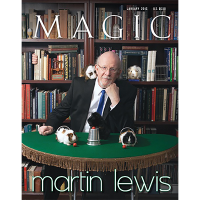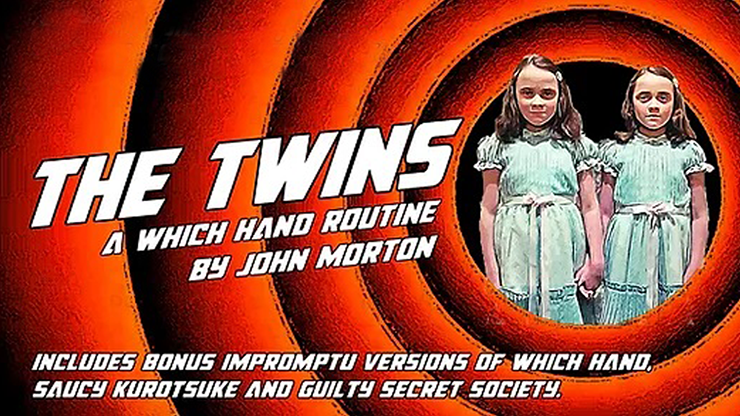Magic Magazine January 2016
Allen, Stan
Magic Magazine

JANUARY 2016
VOLUME 25
NUMBER 5
Martin Lewis, Maker of Magic
By Rory Johnston
Even though his father was a well-known magician, Martin Lewis had no interest in conjuring until he turned 21. Since then, he has had a varied career in magic, from close-up to stage, from Las Vegas to the oceans of the world, and from computer and video programming back to creating magic.
The Wonderful World of Wizardry
By Leo Behnke and Greg Wilson
For a two-week period in December 1967, visitors to Disneyland were treated to a special show of magic and illusions presented by Mickey Mouse and friends. Leo Behnke looks back at his involvement, and Greg Wilson provides details from some of the other creators of that show.
Chris Ramsay - Forever
By Jamie D. Grant
With his mix of magic and cardistry, Chris Ramsay not only takes to the streets but onto social media, regularly providing his followers with moments of art and wonder via Instagram, YouTube, and other digital stages. Ramsay also teaches a trick, I Inked Myself.
Master of the Art of Kindness
By Stephen Minch
Stephen Minch provides a remembrance of his friend Barry Richardson, who died in November. Mentalist, professor, magic creator, author, family man, and an unusual performer, Richardson was memorable and influential. Included here is his routine for a haunted key effect, Spoo-Key.
Plus Updates on... The House of Magic by Franz Harary in Macau. A Moment With... Derek Hughes. Ricky Jay's exhibition of Matthias Buchinger in New York. Remembrances of Dan Waldron and Barrie Richardson. A glance at some upcoming conventions.Bonus Content for the January Issue... Links to videos by Chris Ramsay. Video of Barrie Richardson's talk at MAGIC Live! All sixteen of the products reviewed in the January issue, plus 530 reviews from previous issues, are all now available at the fully searchable "Marketplace" section of M360.Marketplace
Sixteen products are reviewed this month by Peter Duffie, Gabe Fajuri, Jared Kopf, Francis Menotti, Peter Pitchford, John Wilson:
Cube FX by Karl Hein and John George
An Essay On Magic by Robert E. Neale
Pen or Pencil by Mickael Chatelain
Selenium Shift by Chris Severson
Rock, Paper, Lies by Jay Di Biase
Oh Snap! by Jibrizy Taylor
Labyrinth: A Journal of Close-up Magic by Stephen Hobbs
Shadows in the Moonlight by T. Page Wright
Blaze by Tony & Jordan (Les French Twins)
Flight by Michael Afshin
Paragon 3-D by Jon Allen
Big Four Poker by Tom Dobrowolski
Subterranean Deceptions by Mike Pisciotta
Cupid by SansMinds
Quick Change Secrets by The World Record Holders
Another World by Rob Zabrecky
First Look: Kids Show Masterplan
Danny Orleans
Former elementary school teacher Danny Orleans is a performer, author, and lecturer on the art of performing magic for children. In Kids Show Masterplan, he discusses the necessary building blocks for creating your own successful kids magic show. In these excerpts, Danny discusses "The Magical Age of Eight," the importance of "schmooze time" after a show, and "The Most Important Schmooze of My Career."
First Look: Hands Off My Notes
John Guastaferro
A resident of Southern California, John Guastaferro is a performer, lecturer, author, and creator of magic. John says, "My goal with Hands Off My Notes was to put the power of the magic in the participants' hands - letting them play a key role in both the process and the outcome. It has been a stimulating journey of weaving original ideas and old principles, all in the name of creating magic that your audience can see and feel." In this effect, two participants thoroughly cut and shuffle the deck and, together, they find the four Aces.
Making Magic: The Wall
Martin Lewis
The title "Making Magic" says it all. This column will be all about making magic - starting with how to actually make the apparatus, and followed by an explanation of how the props are used in performance to really make magic. This and most future projects are meant for parlor shows and are designed to play to groups of fifty or more. In this first effect, "packs flat plays big" takes front row center with my stage-size version of a brilliant topological effect created by Robert Neale. A volunteer from the audience gets to "Walk Through a Wall," emulating the Houdini mystery. The nice thing about this presentation is that you don't need a bricklayer, just a simple homemade prop.
Loving Mentalism: Color Connection
Ian Rowland
This month, we focus on colors. A spectator stands in front of four pieces of folded, colored card. He chooses one, looks at it, and then places it back among the others. You can now read his mind and tell him which color he selected. There's no force, you never need to be anywhere near the spectator, and you never need to see anything - you could do this blindfolded or even over the phone! What's more, there's no technology involved. If you can get hold of a few pieces of colored card, you can make the simple props required. A beautiful, colorful mystery!
Bent on Deception: Magic Under the Influence
Mike Bent
We are all the product of everyone we have met in our lives, and in comedy it's no different. Our "comedy universe" has been shaped by every comedian, comedy show, movie, book, and theatrical event we have experienced. Your influences can never fully leave you, and that's a good thing. The lessons learned from watching your heroes last a lifetime - lessons about timing, character development, audience interaction, act construction, stage presence, and more. Their examples make you a better performer. You also learn to develop your standards, the ethical compass that can guide your whole career. This becomes your own personal set of rules about what it means to be original, how you present yourself, how you treat an audience, how you work with rather than against other performers.
The Monk's Way: Wilder Pocket Interchange
Steve Reynolds
It's time to turn two toys into two tools. Say that five times fast as you dig out last month's issue of MAGIC Magazine and refresh your memory of the techniques described there. They'll play a critical part in the following routine. In this effect, the four Twos and Queens are shown. The Queens are placed together into one pocket, and the Twos are retained. The Twos then sequentially change into the Queens. A pair of Twos is then removed from the right and left side pockets and added to the Queens. The Queens are caused to vanish and appear in four separate pockets.
Classic Correspondence: Dick Ricton to Gerald Heaney
Mike Caveney
Some years ago, I ran a letter that was written to the Heaney Magic Company by a disgruntled customer. With the publication of this letter, another blistering hatchet job, I could be accused of piling on poor old Mr. Heaney, but I just can't help myself. We've all excitedly torn open a package from a magic dealer, with visions of ourselves decked out in white tie and tails with a beautiful assistant by our side, only to have our dream dashed when a painted soup can and plastic drinking glass drop into our lap. "Twelve dollars for this?! I could have pulled this junk out of my trashcan!" One hundred years ago, a disgruntled customer had only one weapon with which to wage battle: the post office. And so, Dick Ricton sat down at his typewriter and hammered out a threatening letter of protest to Gerald Heaney.
For What It's Worth: I Love It When You Say Google
Mark Kornhauser
Magicians are aware of the power contained in "culturally relevant references." We all know how an audience spontaneously responds to a casual remark about Facebook or Kanye. It triggers fresh associations and speaks to a common denominator. It puts the pop in pop culture. These "association laughs" are easy because they emerge from a deep desire to be a part of the communal experience. This laugh is a disguised primal grunt acknowledging membership in the knowing crowd. Grunt laughs are easy to get, and they provide you with easy Performer Bonus Points.
Walkabout Soup: The Institute of Layman Studies Part 3 - The Thoughtful Recap
Simon Coronel
The point the Institute of Layman Studies (comedic title, but serious concept) is to create better magic performances by finding out how your audiences are experiencing your magic. Not just how they seem to be experiencing it or how you hope they're experiencing it, but how they are actually experiencing it. This month's technique works for any routine, and it's the one I use most frequently of all the tools in the ILS arsenal. The concept is simple: all you're doing is asking someone to tell you what they were thinking during the routine, but asking them to tell you in a much deeper and more detailed manner than you would normally expect.
Your Stories: Making Real Connections
Lee Asher
Every summer, Toronto, Ontario, is home to Buskerfest, the largest street performers' festival on the planet. Talented street acts flock from around the globe so they might share their gift with enthusiastic audiences. On the afternoon we went, one performance stood out. I've never seen anything like it before and it's one of those instances when it makes you reflect on your own life. During Andrew Eland's performance, something terrible happened. Not bad like finding the wrong card, but honestly terrible and gut-wrenching in the kind of way that sends shivers down your spine. As a performer, I never want to face this. Ever. I watched it happen to Andrew.






